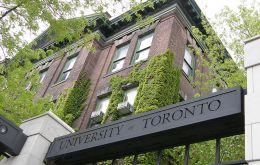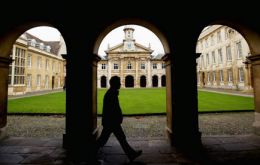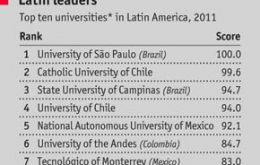MercoPress. South Atlantic News Agency
Tag: University
-
Saturday, May 2nd 2020 - 06:50 UTC
UK universities under financial stress: lockdowns and absence of foreign students

With conferences cancelled and revenues hit because of a lack of rent from student accommodation, Britain's universities are reeling from the global coronavirus pandemic. Schools have already lost millions of pounds thanks to enforced closures under lockdown, and things could get worse still.
-
Saturday, August 19th 2017 - 06:32 UTC
Number of students accepted at UK university drops: demographics, funding and Brexit

The number of students accepted on to UK degree courses has fallen this year, early UCAS (Universities and Colleges Admissions Service) figures show. In total, 416,310 people have taken up places, down 2% compared with the same point last year.
-
Monday, September 23rd 2013 - 16:55 UTC
UK launches ambitious online university project with 21 institutions listed

The UK's biggest online university project has been launched, with more than 20 universities offering free courses. Students will be able to follow courses on mobile phones as well as computers. The UK's project, called FutureLearn, sees UK universities entering the global market in so-called Moocs - massive open online courses.
-
Friday, September 13th 2013 - 20:40 UTC
Canada, Israel, Japan with the most educated status in the world, says OECD

With spiking tuition costs, insurmountable loan balances, and the unemployment rate for recent college graduates at double digit it’s clear that a university education doesn’t receive the best of praise, particularly in developed countries.
-
Tuesday, September 10th 2013 - 23:04 UTC
US and UK dominate top twenty of QS World University Ranking of 2013

United States colleges and universities have once again dominated the QS World University Rankings of 2013 with six prestigious institutions featuring in the top 10. The remaining four places have been occupied by British universities.
-
Tuesday, October 16th 2012 - 07:37 UTC
Brazil implements racial and income affirmative action at federal universities

The law which forces Brazilian federal universities to leave 50% of higher education seats to students from government schools and minorities such as blacks and indigenous became effective on Monday.
-
Friday, September 28th 2012 - 01:12 UTC
UK universities take four of six top slots in global rating

UK universities have taken four of the six top slots in a global university “league table” for 2011-12. Cambridge - top last year - was second in the QS World University Rankings, which are based on a number of areas.
-
Monday, August 6th 2012 - 23:24 UTC
Poor ranking for Uruguay’s main university; Brazil and Chile top of Latam list

Uruguay’s government-financed national university came up in position 79 in the QS academic quality international ranking of the top 100 Latinamerican universities. Brazil, Chile, Mexico, Argentina, Colombia were far better ranked than Uruguay’s Universidad de la Republica, Udelar, which has caused deep concern among government officials.
-
Wednesday, October 19th 2011 - 15:16 UTC
The Economist: Latin American universities far from excellence in higher education

The Economist has an interesting article, and comments, on the quality of higher education in Latin America based on the latest ratings from UK, US and Chinese education consultancies.
-
Wednesday, October 5th 2011 - 08:18 UTC
Brazil with the best universities in Latam; Sao Paulo top of the list

Brazil’s Sao Paulo University, USP, ranks as the top higher education institution in Latin America according to a list published by QS, and which includes universities from Brazil, Chile, Colombia, Mexico and Argentina.
